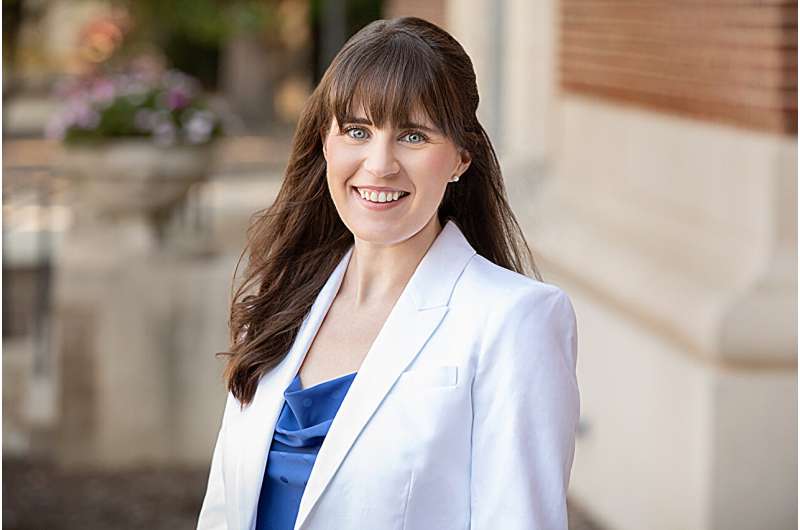This article has been reviewed according to Science X's editorial process and policies. Editors have highlighted the following attributes while ensuring the content's credibility:
fact-checked
trusted source
proofread
News media trigger conflict for romantic couples with differing political views

By one estimate, as many as 30% of people in the U.S. are in romantic relationships with partners who do not share their political views. In today's hyperpartisan climate, where Democrats and Republicans have difficulty talking to each other and their views are polarized about media outlets' credibility, how do couples with differing political perspectives decide which media to follow? And how do these decisions affect their discussions on political issues and their relationship in general?
To explore these questions, University of Illinois Urbana-Champaign communication professor Emily Van Duyn conducted in-depth interviews with 67 people whose partners' political views differed from their own. For these couples, seemingly mundane decisions about media consumption became "especially difficult," Van Duyn said.
"Their cross-cutting political views presented many challenges for these couples," Van Duyn said. "Deciding which media to consume and whether to do so together or separately was difficult because it presented them with a choice about recognizing their political differences and finding a way to navigate them.
"They saw the news as inherently political, and their selection of a news outlet or the act of sharing an article or video meant they were intentionally pulling their partner into a recognition of their political differences."
News coverage activated differences between the partners that otherwise would not have emerged, sparking conflict as well as discussion. Conflict emerged in various ways, including disagreement over news sources and content, but also when one person failed to respond as intensely as their partner when the latter shared news that they found disturbing or alarming, Van Duyn said.
Partners' differing political beliefs and/or identities created a need to influence or negotiate their news consumption, a process that Van Duyn calls "negotiated exposure" and that played out across public-facing media such as television and those that are more private in nature like social media.
This process and the interpersonal conflict that resulted from it "often worked in tandem to reinforce one another and impact the relationship," Van Duyn said. "Conflict resulting from news consumption often caused individuals to seek greater control of their news exposure, a reinforcing process that highlights the muddled order in how individuals simultaneously navigate news and relationships in contemporary democracy."
Van Duyn chose to interview only one partner from each couple so that participants would feel comfortable speaking freely without the concern of impacting their relationship or feeling constrained by their partners' views. To protect the privacy of those interviewed, who were recruited through social media advertisements, pseudonyms were used in the study.
Of the participants, 39 were female, 27 were male and one identified as non-binary. Most were in opposite-sex relationships and had been in their current relationship more than two years. The majority (42) of the study participants where white, 11 were Black, three were Hispanic and 11 were Asian.
A 46-year-old Virginia woman identified as "Wendy" in the study was a Donald Trump-supporting Republican whose boyfriend of two years was a Democrat who voted for Hillary Clinton. Wendy said that she and her partner compromised on which news programs they viewed on television and when, with Wendy having control over programming during the morning hours and her boyfriend's preferences taking precedence during the afternoon.
Since the couple fervently disagreed about then-President Trump, co-viewing TV news together created friction, especially when Wendy felt there was too much negative coverage of Trump and wanted to avoid it. Moreover, negative news stories about Trump made Wendy susceptible not only to her boyfriend's criticism of her favored candidate—but also of herself, personally.
Some couples sought a common media outlet they could agree on to co-view together, while others intentionally chose to consume news independently, whether in separate rooms or by scrolling their social media feeds on separate devices while in each other's company. Other individuals sought ways of consuming news with their partner that superseded their differences and utilized other news media privately, according to the study.
Nancy, a 49-year-old Michigan woman who had switched from voting Republican to voting Democratic in 2016 and 2020, said her husband was a Trump supporter that held political beliefs she described as "diametrically opposed" to her own. News was a significant source of conflict between them as was Nancy's ideological shift, which her husband attributed to her viewing CNN.
Nancy, who worked from home, responded by watching CNN secretly during the day when her spouse was away and kept her political activity—working as a text banker for the Democratic party during the 2020 election—secret as well.
"The point in their relationship when couples' political differences emerged affected how partners negotiated news with one another," Van Duyn said. "While some were aware of their ideological differences at the outset of the relationship, other individuals found their shared tradition of amicably co-viewing the news together disrupted when their partners' views or party affiliation changed. Negotiations around news selection in cross-cutting relationships involved a negotiation of political identity as much as of news exposure."
When the news began to take a negative toll on some participants and their relationship, these couples decided to avoid the news altogether and quit sharing articles or videos with each other because doing so triggered tensions that affected their emotional intimacy.
Van Duyn said that some of those who chose news avoidance cited heightened conflict within their relationship or mental health concerns such as anxiety.
The study is published in the journal Political Communication.
More information: Emily Van Duyn, Negotiating News: How Cross-Cutting Romantic Partners Select, Consume, and Discuss News Together, Political Communication (2023). DOI: 10.1080/10584609.2023.2270445
Provided by University of Illinois at Urbana-Champaign



















